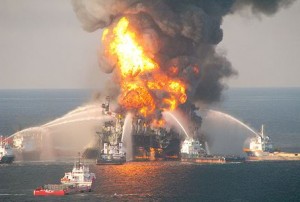With the BP oil spill disaster in the Gulf of Mexico still unfolding and still with at least two months to go before it’s going to even start getting better, I think it’s now time to add my tuppence worth, since a lot has happened in the two months since the disaster started and I don’t want to lose track of things.

The Deepwater Horizon drilling rig exploded on 20th April killing all aboard and eventually sank leaving an uncapped oil well on the sea floor.
I do not for one minute want to imply that this disaster is anything other than epic. It is the world’s third most serious oil spill in history and the second most serious spill caused by an industrial accident rather than a war (the most serious spill was during the first Iraq War, and we have some way to go before the amount of oil spilt in the Gulf of Mexico exceeds that spilt in Iraq). I do not however believe that BP are being treated fairly over it, nor that the United States are in any position to lecture BP (and, by extension, Britain) on industrial accidents. Let’s have a brief look at their record from the 1980s:
In December 1984 the Union Carbide chemicals plant in Bhopal leaked lethal chemicals into the surrounding environment, exposing over 500,000 people and ultimately killing 15,000. The accident happened as a result of endemic mismanagement and violations of health and safety procedures. Union Carbide eventually paid $470m in compensation 15 years later, equivalent to $940 per exposed victim. The Union Carbide plant in Bhopal now stands derelict and the area is still contaminated. Neither Union Carbide or their new owners Dow Chemical have made any attempt at cleaning it up. It is the world’s worst industrial disaster in terms of human deaths*.
In July 1988 the Piper Alpha oil rig in the North Sea, operated by US firm Occidental, was destroyed in an explosion and fire which killed 167 workers, leaving only 59 survivors. The enquiry that followed was critical of Piper Alpha’s operator, Occidental, which was found guilty of having inadequate maintenance and safety procedures, but no criminal charges were ever brought against it.
In March 1989 the Exxon oil tanker Exxon Valdez hit the Bligh Reef in Prince William Sound and spilt a minimum of 750,000 barrels of oil into the surrounding waters. The collision happened as a result of a combination of factors, including broken sonar equipment (which Exxon Valdez Shipping considered too expensive to repair and operate) and crew fatigue and workload caused by the company’s failure to provide a sufficient crew. They were initially ordered to pay $287m in actual damages and $5b in punitive damages but this was reduced to a total of $507m after a series of appeals from Exxon. Hundreds of thousands of birds and animals were killed and the effects of the spill were felt for years afterwards.
The point of reminding everyone about these incidents is that nobody has a perfect record when it comes to this sort of thing. These things happen, thankfully not all that often, but they do happen and they will continue to happen, although their frequency will no doubt become less and less as technology and regulation improves over time. In this regard I think that it’s completely unfair and unnecessary to vilify British Petroleum over the Deepwater Horizon disaster. I have absolutely no doubt that they are doing all they can to contain this disaster and will continue to make amends far into the future. But they cannot do that if they are basically going to be wiped out by an angry and vengeful United States government and frankly hypocritical United States big oil companies.
Insatiable thirst for oil
The only reason why we have deep water drilling projects in the first place is because our insatiable appetite for oil and oil based products has meant that resources that are easier and cheaper to exploit are now running low and so we have to look to more expensive and risky sources. Oil companies from all around the world seem to have no problem in doing whatever is necessary to satisfy this thirst. It just so happens that an accident has happened to BP, but in all reality it could have happened to Exxon, Chevron, Shell or any other oil company, and if what I’ve learnt in the news about the response plans for such a disaster being identical between all these companies then it really was just a case of luck as to who would have to deal with it first.
Clean Energy
For decades and decades huge oil companies have wielded disproportionate amounts of power in the business and political arenas of the United States. Some recent presidents have been little more than puppets for Big Oil. Thankfully the current president isn’t, but he still represents a country that makes a hell of a lot of money out of oil. I applaud his commitment to cleaner energy that he has announced since this disaster happened, but I do rather feel that it’s like trying to rub ointment into a gaping wound at this point. For years and years oil companies have been suppressing clean energy technologies and companies that would otherwise threaten their business by quietly buying them up and shutting them down, without fear of any reprisals from government or politicians. This has to stop and oil companies have to appreciate that, like record companies, their business models need updating in this modern world.
Compensation hypocrisy
BP is a key company in most UK pension funds, which means that this disaster is going to severely impact those funds. This is serious news in an economy that is barely out of recession and now has a deficit of extraordinary proportions following a devastating financial downturn, a financial downturn which, not incidentally, was in part caused by the United States in the first place. So if we’re going to start talking about massive amounts of compensation from BP to the United States and the people whose livelihoods are being affected by this let’s also start talking about compensation to the UK from all the financial institutions in the United States who brought about the banking crisis and the meltdown that followed it two years ago. Until then I’m not interested.
It should also not go un-noted that the Deepwater Horizon rig was leased by BP from an American company and was operated by American employees, to provide a product that would feed the American market. BP really are just the unlucky face of this enterprise. In future I don’t expect they’ll make the same mistake again and just let American companies make and take the flack for their own mess.
Conclusion
So, rant over. In conclusion, let BP get on with the job and stop hassling them. It’s better to let them spend the time doing rather than explaining when something goes wrong, like any techie will tell you. It would be a different story if it was an American company rather than BP, the fact that it wasn’t an American company is down to nothing more than shear luck.
I have a lot of respect for Barrack Obama, more than I’ve ever had for any other United States president in my lifetime. He has utterly transformed the image of the United States in this country and internationally following the disastrous reign of George Bush Jnr. But as the title of this post suggests, he’s definitely lost his shine over this and needs to be careful not to undo all his good work by pandering hypocritical outrage at home.
* I personally consider the Chernobyl disaster to be the world’s worst industrial accident, even though far fewer people were killed either directly or indirectly.
 I’ve much to thank the Internet for and I’m only sorry that it didn’t come along earlier. It certainly would be different without it.
I’ve much to thank the Internet for and I’m only sorry that it didn’t come along earlier. It certainly would be different without it.




